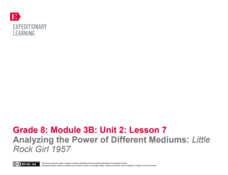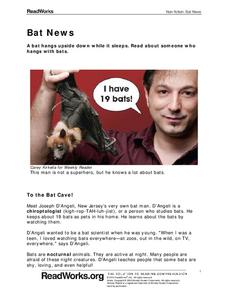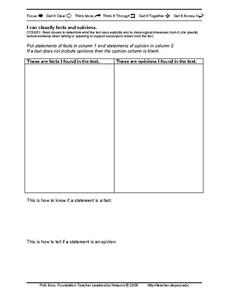NOAA
History's Thermometers
How is sea coral like a thermometer? Part three of a six-part series from NOAA describes how oceanographers can use coral growth to estimate water temperature over time. Life science pupils manipulate data to determine the age of corals...
CPALMS
Analyzing Vonnegut's View of the Future and His Commentary on the Present in Harrison Bergeron
Kurt Vonnegut's short story "Harrison Bergeron" engages adolescents with its theme about the dangers of complete societal equality. Learners complete a graphic organizer to track literary elements in the story, as well as an inference...
Teacher's Corner
Hey Batter, Wake Up!
Does jet lag affect a baseball team's performance in games? Read about how a baseball team's chance of winning a game can be affected by traveling over one, two, and three time zones. Readers then respond to five short answer questions...
Have Fun Teaching
Context Clues (5)
Unfamiliar words can make it difficult to understand what a piece of writing is trying to say. Practice using context clues to define words you don't know with a language arts worksheet, which features five sentences and enough space to...
Visa
Make It Happen: Saving for a Rainy Day
Every little penny counts, especially when it comes to saving for emergencies or long-term goals. Pupils evaluate different saving and investment strategies, such as a CD or money market account, through worksheets and by researching...
Have Fun Teaching
When Am I? (16)
How can you tell when a story takes place? Use context clues to infer the time of day and seasons of five short reading passages. Kids then note each passage's time period as daytime or nighttime, as well as winter or summer.
EngageNY
Mid-Unit Assessment: Close Reading of the "Spadefoot Toad"
A mid-unit assessment challenges scholars to use their close reading skills to identify the main idea and key details. After reading a brief excerpt, learners answer a series of questions—multiple-choice, short answer—complete a graphic...
EngageNY
Comparing Meaning and Tone: The Fall of Saigon in Fiction and Informational Text
Who's that talking to? Readers listen to a reading of the "Forgotten Ship" transcript and answer questions focusing on word meaning and choice. They complete a chart to track the multiple narrators in the script. For homework, readers...
Angel Island Immigration Station Foundation
How Do Pictures Tell the Story of Angel Island?
Young historians learn more about the history of Angel Island Immigration Station through their analysis of primary source images. Guided by a list of inferential questions, scholars learn how to make and record observations on a...
Texas Education Agency (TEA)
Distinguishing Between Inductive and Deductive Reasoning (English III Reading)
Is Sherlock Holmes an inductivist or a deductivist? Users of this interactive to distinguish between inductive and deductive reasoning. They consider in various situations whether it is better to list evidence and then introduce a claim...
Mr. Nussbaum
Abraham Lincoln Reading Comprehension—The Presidential Years (Part 4)
How do you bring a nation back together after there is civil war? Readers learn how the United States Civil War concluded with a passage focused on the latter part of Abraham Lincoln's presidency. Multiple choice questions check pupils'...
Reed Novel Studies
The Homework Machine: Novel Study
Do opposites really attract? The D Squad in The Homework Machine includes of a quad of opposites. The group, made up of a teacher's pet, a geek, a class clown, and a slacker, make use of a machine to do their homework. In response to the...
Reed Novel Studies
The Railway Children: Novel Study
How can you prove your innocence? After being falsely accused and placed in prison, the father in The Railway Children is looking for the answer to the question. The children make friends with an elderly gentleman who helps them prove...
Curated OER
Frindle: A Guiding Reading Unit
Guide your class through a reading of the popular children's book, Frindle, with this comprehensive literature unit. Starting with a brief introduction to the guided reading process, the class goes on to read the story two chapters at a...
California Education Partners
The Road Not Taken
An effective lesson plan truly can make all the difference. Seventh graders read, analyze, and annotate Robert Frost's "The Road Not Taken" before writing an essay about what they believe to be the theme of the iconic poem.
EngageNY
Analyzing the Power of Different Mediums: Little Rock Girl 1957
Scholars begin the instructional activity by watching a video of media history and discussing it in a Turn and Talk. They then look at the texts A Mighty Long Way and Little Rock Girl 1957 to make a connection to the role of the press in...
Curated OER
Reading Comprehension: Guinness Book of World Records
If your learners are curious about human achievement, superlatives, or esoteric trivia, the Guinness Book of Records is a way to tap into instrinsic motivation and relevance. Here's an informational reading that will grab their attention...
Great Books Foundation
On the Origin of Species
How did Charles Darwin support his controversial theory of evolution with evidence? Use an excerpt from his 1859 work On the Origin of Species to reinforce the importance of making inferences within an informational text, and to discuss...
Great Books Foundation
The Road Not Taken
Every time you make a choice, it prevents another option from taking shape. Spend some time analyzing "The Road Not Taken" by Robert Frost with a reading activity that includes four discussion questions that recall evidence from the text.
Curated OER
Tools of Persuasion
Ethos, pathos, and logos. After reading a passage about Aristotle's, three basic tools of persuasion, individuals answer a series of multiple choice comprehension questions and craft responses to three short-answer essay prompts.
Read Works
Bat News
Get the bat facts with a short nonfiction reading passage. After reading the passage, readers respond to questions that focus on main idea, inferencing, vocabulary in context, and author's purpose.
Polk Bros Foundation
I Can Identify/Infer Motive
Why do people and characters act as they do? Require your class figure out the motivation of two people or characters they read about in a given text. In the short charts, pupils note down who, what they do, and why they do it. After...
Polk Bros Foundation
I Can Sequence Important Events
After reading any short informational or fictional text, ask your class to analyze the important events. They note down three important events on a short timeline, describing the events with either words or drawings. After this, pupils...
Polk Bros Foundation
I Can Classify Facts and Opinions
Telling fact from opinion can be tricky. Direct your class to practice their reading and comprehension skills by taking notes on the facts and opinions in a text. Pupils fill out a two-column chart and write down how they know a...
Other popular searches
- Making Inference in Math
- Teaching Making Inference
- Making Inference Handout
- Making Inference Using Art
- Making Inference Worksheet
- Inference and Prediction
- Making Inference Review Game
- Making Inference Lessons
- Lesson on Making Inference
- Making Inference Using Coin
- Making Inference: Reading
- Making Inference Seuss
























